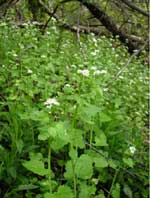You are here
Invasive Plants in the News
HF research on invasive plants demonstrates critical evidence that a noxious alien weed causes ecological damage in the  Northeast
Northeast
Garlic mustard (Alliaria petiolata), an invasive plant that has spread across much of the U.S. harms native maples, ashes, and other hardwood trees by releasing chemicals harmful to a soil fungus the trees depend on for growth and survival, reports a study led by Harvard Forest Researcher Kristina Stinson, this week in the Public Library of Science. The tree-stifling alien, first introduced into the U.S. in the 1860s, has since spread to Canada and 30 states in the East and Midwest, with recent sightings as far west as Oregon. While many mechanisms - from the absence of natural predators or parasites to the disruption of long-established interactions among native organisms - have been proposed to explain the success of invasive species, this new work is the first to show that an invasive plant harms native plants by thwarting the biological "friends" upon which they depend for growth.
Read the press release.
Stinson, K.A., Campbell, S.A., Powell, J.R., Wolfe, B.E., Callaway, R.M., Thelen, G.C., Hallett, S.G., Prati D, Klironomos, J.N. (2006) Invasive Plant Suppresses the Growth of Native Tree Seedlings by Disrupting Belowground Mutualisms. PLoS Biol 4(5): e140

